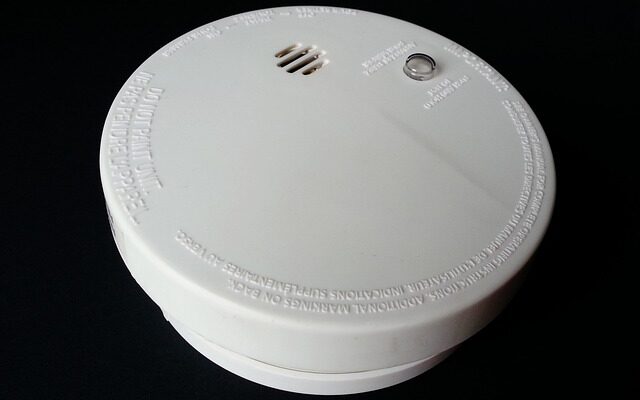Causes of Chirping in Hard Wired Smoke Detectors
Hard-wired smoke detectors are an essential part of home safety systems. Although they are designed to keep us safe from fire hazards, sometimes they can start chirping unexpectedly, causing frustration and confusion for homeowners. There are several causes that can lead to the chirping of hard-wired smoke detectors.
One common cause of chirping in hard-wired smoke detectors is a low battery. Despite being hard-wired into the home’s electrical system, smoke detectors often have a backup battery to ensure they keep working during power outages. If this battery is running low, the smoke detector will emit a chirping sound to alert the homeowner that it needs to be replaced or recharged.
Another cause of chirping can be a dirty or dusty smoke detector. Over time, debris can accumulate on the sensor or inside the detector, causing malfunctions. Regular cleaning and maintenance can help prevent this issue.
Intermittent chirping can also occur if the smoke detector is nearing the end of its lifespan. Most smoke detectors have a recommended replacement period of 7-10 years. As they age, the internal components can deteriorate, causing false alarms or chirping sounds.
Lastly, some hard-wired smoke detectors have interconnected features, meaning if one detector detects smoke, all the detectors in the system will sound an alarm. This can cause confusion, as the chirping sound may not necessarily be coming from the location of the issue.
If your hard-wired smoke detector is chirping, it is important to address the cause promptly. Check the battery, clean the detector, and ensure it is within the recommended lifespan. By identifying and resolving the underlying issue, you can restore the peace of mind that comes with a functioning smoke detector system.

Troubleshooting Chirping in Hard Wired Smoke Detectors
Troubleshooting Chirping in Hard Wired Smoke Detectors
If you have hard-wired smoke detectors in your home, you may occasionally experience the annoyance of a chirping sound. This chirping is an indication that something is wrong with your smoke detector and needs to be addressed. In this article, we will explore the common causes of chirping in hard-wired smoke detectors and provide troubleshooting tips to help you resolve the issue.
One of the main causes of chirping in hard-wired smoke detectors is a low battery. Despite being connected to a power source, most hard-wired smoke detectors have a backup battery that needs to be replaced periodically. If the battery is low, the smoke detector will emit a chirping sound to alert you. In this case, simply replace the battery with a fresh one and the chirping should stop.
Another reason for chirping could be a faulty or malfunctioning smoke detector. Over time, smoke detectors can become dusty, causing false alarms or constant chirping. Clean the detectors using a soft, dry cloth to remove any accumulated dust or debris. If the chirping persists, the smoke detector itself may need to be replaced.
Additionally, power surges or electrical issues can also cause chirping in hard-wired smoke detectors. Check your circuit breaker to ensure that the smoke detector is receiving power. If the circuit breaker has tripped, reset it and monitor the smoke detector. If the chirping continues, consider calling a professional electrician to inspect the wiring.
Overall, troubleshooting chirping in hard-wired smoke detectors involves checking the battery, cleaning the detector, and ensuring proper electrical connections. By following these simple steps, you can restore your peace of mind and ensure the safety of your home and loved ones.

Frequently Asked Questions (FAQs) about Chirping Smoke Detectors
to target a wider audience. Include relevant keywords, such as “chirping smoke detectors,” “FAQs,” and “smoke alarm troubleshooting.” Make sure to provide informative and concise answers that address the most common concerns and problems users may have with chirping smoke detectors.
1. Why is my smoke detector chirping?
Chirping smoke detectors often indicate a low battery. The chirping sound is a warning signal designed to alert users to replace the battery. It is recommended to change the batteries every six months to ensure the smoke detector’s effectiveness. If the chirping persists after changing the battery, it might indicate that the detector itself needs replacing.
2. How do I stop my smoke detector from chirping?
To stop the chirping sound, replace the battery with a fresh one. Ensure that the replacement battery is the correct type and properly inserted. If the chirping continues, try cleaning the smoke detector using a can of compressed air to remove any dust or debris that might interfere with the sensor.
3. Can I silence a chirping smoke detector temporarily?
Most smoke detectors have a silencing feature to temporarily quiet the chirping sound. Look for a button labeled “silence” or “test/reset” and press it to stop the chirping for a short period, typically around 15 minutes. Keep in mind that silencing the alarm doesn’t solve the underlying issue, so it’s crucial to address the problem promptly.
4. Why does my smoke detector chirp even with a new battery?
If the smoke detector continues to chirp after installing a new battery, it may indicate other issues. It could be a faulty smoke detector that needs replacement or a sensor error caused by environmental factors like dust or humidity. Consider cleaning the detector or consult a professional electrician if the problem persists.
5. How often should I replace my smoke detectors?
Smoke detectors should be replaced every ten years to ensure optimal performance. Over time, sensors and components may deteriorate, leading to reduced sensitivity or malfunctioning. It is essential to regularly test and replace smoke detectors to maintain a safe and reliable home fire detection system.
Remember, regularly maintaining and testing your smoke detectors is crucial for the safety of your home and loved ones. If you have further concerns or questions specific to your smoke detector model, refer to the manufacturer’s guidelines or contact their customer service for assistance.

Common Issues and Solutions for Chirping Hard Wired Smoke Detectors
and avoid jargon. Use relevant keywords throughout the description for better search engine optimization. Provide useful information on common issues and practical solutions for chirping hard-wired smoke detectors.
Common Issues:
1. Low Battery: One of the main reasons for chirping smoke detectors is a low battery. This can be identified by the intermittent chirping sound. Ignoring this can lead to a false sense of security as the detector may not function properly during an emergency.
2. Wiring Problems: Improperly connected or faulty wiring can also cause smoke detectors to chirp. Loose connections or damaged wires can disrupt the electrical flow, triggering the alarm system.
3. Dust and Debris: Accumulation of dust and debris within the smoke detector can interfere with its sensors, causing false alarms or constant chirping. It is important to regularly clean and maintain the detectors to avoid this issue.
Solutions:
1. Replace the Battery: If the smoke detector is chirping due to a low battery, replace it with fresh batteries. Make sure to use high-quality batteries for reliable performance. Regularly check and replace batteries to ensure continuous functionality.
2. Check Wiring Connections: Inspect the wiring connections of the smoke detector to detect any loose or damaged wires. Properly reconnect or replace faulty wires to restore the detector’s proper functioning.
3. Clean the Detector: Regularly clean the smoke detector by gently vacuuming or blowing away any dust or debris that may have accumulated. Make sure to follow the manufacturer’s instructions while cleaning to avoid any damage.
By understanding and addressing these common issues, homeowners can ensure their hard-wired smoke detectors are functioning optimally and providing the necessary protection in case of a fire emergency. Regular maintenance, such as replacing batteries and cleaning, can help prevent false alarms and ensure reliable performance of the smoke detectors.

Maintenance Tips to Prevent Chirping in Hard Wired Smoke Detectors
to ensure readability and engagement.
Title: Maintenance Tips to Prevent Chirping in Hard Wired Smoke Detectors
Meta Description: Learn how to prevent chirping in hard wired smoke detectors with these maintenance tips. Read on to ensure the safety of your home and loved ones.
Introduction:
Hard wired smoke detectors are essential safety devices that can save lives in case of a fire. However, the constant chirping sound they emit can be quite annoying and disruptive. This article provides maintenance tips to prevent chirping in hard wired smoke detectors, ensuring their optimal functionality.
1. Replace the batteries regularly:
Although hard wired smoke detectors are connected to the electrical system, they still have backup batteries. It is important to replace these batteries every six months to prevent the chirping sound caused by low power.
2. Clean the detectors:
Dust and debris can accumulate over time, causing the smoke detectors to trigger false alarms or emit chirping sounds. Regularly vacuum or dust the detectors to keep them clean and functioning properly.
3. Test the detectors:
Periodically test the smoke detectors by pressing the test button. This ensures that they are working correctly and not causing false alarms or chirping sounds.
4. Check the power source:
Unplug the smoke detectors and check the power source connections. Ensure that the wiring is secure and there are no loose connections. Faulty wiring can lead to intermittent chirping or malfunctioning.
5. Replace the detectors when necessary:
Smoke detectors have a limited lifespan, typically around ten years. If the chirping persists despite following maintenance tips, it may be time to replace the detectors with new ones to ensure optimal functionality and safety.
Conclusion:
By following these maintenance tips, you can prevent chirping in hard wired smoke detectors, ensuring their effectiveness in alerting you to potential fire hazards. Regularly replacing batteries, cleaning the detectors, testing them, checking the power source, and replacing them when necessary will keep your home safe and free from annoying chirping sounds.

